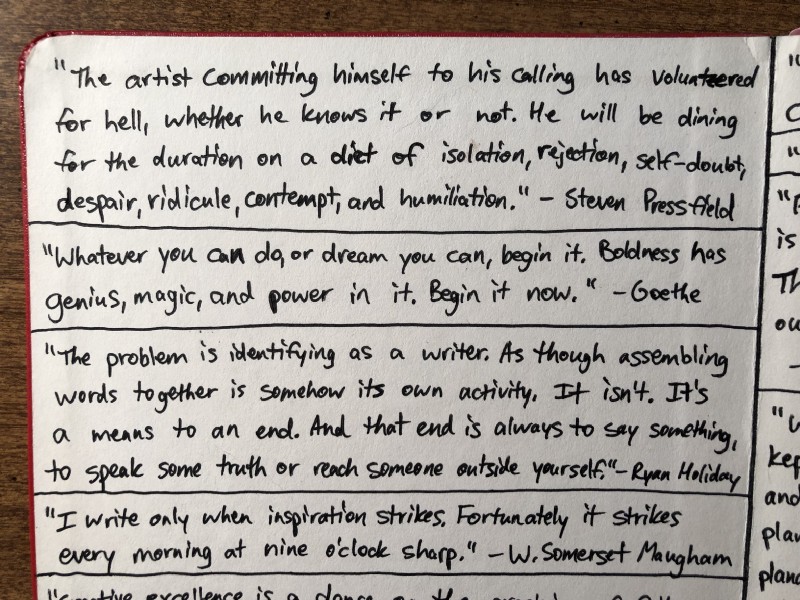Steven Pressfield’s Top 13 Writing Tips
The elusive goal in historical fiction is to create a world so real that your readers can feel and see history developing around them.
Steven Pressfield accomplished that feat with Gates of Fire, which tells the story of King Leonidas’s Spartans battling the warrior hordes from Persia.
Pressfield’s imagery and storytelling are so realistic that West Point, the U.S. Naval Academy, and the Marine Corps’ “The Basic School” teach his book to their young cadets. A writer who can convey such power with words is undoubtedly worthy of emulation.
But Pressfield struggles with the creative process just like the rest of us.
In his book The War of Art, Pressfield shares his struggle fighting “Resistance” — the force inside each of us that holds us back.
Below are the top 13 lessons I learned from The War of Art.
1. Recognize your enemy: the Resistance.
“Are you a writer who doesn’t write, a painter who doesn’t paint, an entrepreneur who never starts a venture? Then you know what Resistance is.” -S. Pressfield
I know hundreds of people who have big passions, but the number of people who actually pursue those dreams can fit on my ten fingers. Passion dwells in the land of plenty, while progress resides in the land of famine.
The barrier between passion and progress is Resistance.
Resistance is the devil on your shoulder that says you aren’t good enough.
It is the whisper in your ear that says you should hit the snooze button.
It is the most pernicious force we battle in our fight to produce creative work.
2. Use Resistance as a compass.
“Resistance will unfailingly point to true North — meaning that calling or action it most wants to stop us from doing. We can use this. We can use it as a compass. We can navigate by Resistance, letting it guide us to that calling or action that we must follow before all others.” -S. Pressfield
Some of the stories I’ve postponed writing for the longest time have been the ones that resonated with the most people. They were the stories that scared me — stories I thought I wasn’t talented enough to tell.
For example, I didn’t trust myself to explain why productivity can be harmful, why companies give promotions to the wrong people, or why people don’t prioritize their passions.
I didn’t think I could articulate the nuances of those topics in a simple story. Resistance got the better of me for months until I finally used it as a compass.
What is Resistance telling you to avoid right now?
3. Avoid the allure of distraction.
“Procrastination is the most common manifestation of Resistance because it’s the easiest to rationalize. We don’t tell ourselves, ‘I’m never going to write my symphony.’ Instead we say, ‘I am going to write my symphony; I’m just going to start tomorrow.’” -S. Pressfield
It’s easier to procrastinate now than ever before in history.
Why? Because we live in an age rife with distraction. Within seconds, we could be perusing our Instagram feed, shopping online for new clothes that will arrive within hours, or checking the score of last night’s NBA game.
Our brains are inherently lazy, and they trick us into thinking we need to do something else (anything else!) the moment we sit down to work.
Don’t succumb to Resistance’s devious tricks.
4. Choose to be a professional.
“To the amateur, the game is his avocation. To the pro, it’s his vocation. The amateur plays part-time, the professional full-time. The amateur is a weekend warrior. The professional is there seven days a week.” -S. Pressfield
When I became serious about my writing, I immediately made several investments in myself.
I became a paying Medium member so I could learn from the best writers.
I bought the premium version of Grammarly so I could improve my editing.
I paid for a better URL for my blog.
When we choose to turn pro in our work, we remove our amateur goggles and begin seeing the playing field from a new perspective.
We find time in our schedules we didn’t know we had. We take a long-term view and begin investing in ourselves. These small changes make a significant impact — pragmatically and psychologically.
Make the choice today to become a professional.
5. Leverage the power of the Universe.
“When we sit down day after day and keep grinding, something mysterious starts to happen. A process is set into motion by which, inevitably and infallibly, heaven comes to our aid. Unseen forces enlist in our cause; serendipity reinforces our purpose.” -S. Pressfield
A paradoxical thing about writing is that forces conspire against us before we’ve begun our work, but often conspire for us once we’ve begun it. It’s like the Universe hates creativity but loves creation.
Here’s what I mean…
Think back to all of the times you failed to start an important project: a novel, a song, a poem, etc. Resistance stood in your way.
Now think back to the times you “lucked out” after having started a project: The time you remembered the perfect quote to conclude your blog article. The time you heard a catchy radio jingle that inspired the chorus of a song you had begun to write. The time you watched a baby’s eyes light up after seeing something, then used that inspiration as the final stanza of your poem.
Once we begin our task, the wind is at our back. Luck turns in our favor. But we can only earn that luck by sitting down and grinding.
The Muse is a sucker for hard work.
6. Don’t criticize anyone who is in the arena.
“If you find yourself criticizing other people, you’re probably doing it out of Resistance. When we see others beginning to live their authentic selves, it drives us crazy if we have not lived out our own. Individuals who are realized in their own lives almost never criticize others. If they speak at all, it is to offer encouragement.” -S. Pressfield
This concept reminded me of Theodore Roosevelt’s “Man in the Arena” quote.
As writers and creators, we know the sting of criticism better than most. We should admire anyone who dares to step into their creative arena: art, music, nonfiction, fiction, poetry, etc.
Whenever I feel the poison of criticism rising up my throat, I try to remind myself that my critique is likely coming from a place of jealousy.
Learn to see criticism for what it really is: a mirror of your insecurities.
7. Prepare for difficulty.
“The artist committing himself to his calling has volunteered for hell, whether he knows it or not. He will be dining for the duration on a diet of isolation, rejection, self-doubt, despair, ridicule, contempt, and humiliation.” -S. Pressfield
Damn. Pressfield doesn’t mince words here, but I appreciate that.
I know you didn’t click on this post expecting to read a quote that effectively says, “Buckle up, this is going to suck.” But that’s sometimes the reality of chasing our dreams. We have to push through difficulty to succeed.
I’ve begun to use Pressfield’s quote above as a rallying cry. As soon as I read those words, I immediately wrote them on the inside cover of my writing journal (depicted below).
Those words not only remind me that I will face difficulty, but they remind me that I will choose to write regardless of the challenges I face. I love writing too much to stop, so I steel myself against the challenges I will face.

8. Do it for you — not them.
“Of any activity you do, ask yourself: If I were the last person on earth, would I still do it?” -S. Pressfield
There are dozens of bad reasons why someone would want to become a writer: prestige, money, fame, etc. There is only one good reason: you cannot help yourself.
What force compels you to write? Is that compulsion internal or external?
9. Listen to feedback with your ears — not your heart.
“The professional gives an ear to criticism, seeking to learn and grow. But she never forgets that Resistance is using criticism against her on a far more diabolical level.” -S. Pressfield
I’m a big proponent of feedback. I regularly ask my boss for feedback, give trainings at work about feedback, and have even written stories about both giving and receiving feedback.
In short, I’m not afraid of feedback. But I am afraid of what feedback can do to us if we listen to it with our hearts rather than our ears.
Ask for constructive criticism, listen to it intently, and make improvements based upon what you’ve heard, but don’t let it pierce into the deepest parts of your being. Don’t let criticism dampen your creative energy.
10. Don’t wait until you overcome fear.
“The amateur believes he must first overcome his fear; then he can do his work. The professional knows that fear can never be overcome. He knows there is no such thing as a fearless warrior or a dread-free artist.” -S. Pressfield
Fear doesn’t go away. Even long-time writers like Stephen King and Natalie Goldberg say they still experience anxiety when writing.
You and I should become comfortable with fear because it’s going to be riding shotgun for the entirety of our creative journeys.
11. Be patient.
“The professional arms himself with patience, not only to give the stars time to align in his career, but to keep himself from flaming out in each individual work. He knows that any job, whether it’s a novel or a kitchen remodel, takes twice as long as he thinks and costs twice as much. He accepts that. He recognizes it as reality.” -S. Pressfield
It’s easy to watch someone’s ascendance and think to yourself, “That person became successful, and this was their first book, album, etc. I can do that.”
These thoughts are half good and half bad. Yes, it’s great to be optimistic, but it’s also important to remember the gates of success are greased by the sweat of late nights and early mornings.
It takes a long time to refine a craft and build a reputation. Each step you take builds your catalog of work. What step are you taking today?
12. Write about what interests you.
“I did what I myself thought was interesting, and left its reception to the gods.” -S. Pressfield, re: the success of his book The Legend of Bagger Vance
I often find myself thinking about what topics I can write about that would appeal to a broad audience. This is wrongful thinking.
It’s much better to pursue our passions — wherever they may lead us. Write about things of interest to you: topics you care about, ideas you want to learn more about, concepts you can’t shut up about.
When we write about these visceral topics, we tap into a wellspring of creativity, passion, and curiosity within us that will resonate with readers.
13. Give the contribution only you can give.
“It may help to think of it this way. If you were meant to cure cancer or write a symphony or crack cold fusion and you don’t do it, you not only hurt yourself, even destroy yourself. You hurt your children. You hurt me. You hurt the planet…Creative work is not a selfish act or a bid for attention on the part of the actor. It’s a gift to the world and every being in it. Don’t cheat us of your contribution. Give us what you’ve got.” -S. Pressfield
You have something to offer the world. Your childhood, work experiences, breakups, successes, and sob stories have planted seeds that will blossom into unique fruit only you can share with the world.
What can you do today to begin sharing your story?
If you have the opportunity, read Pressfield’s book The War of Art. It will encourage you, challenge you, and inspire you to conquer Resistance.
Until you read the full book, I hope you’ve enjoyed this digestible summary.
Happy writing!







